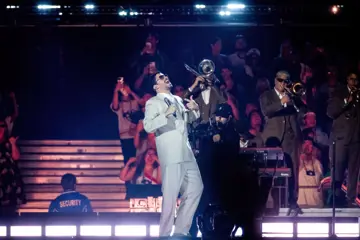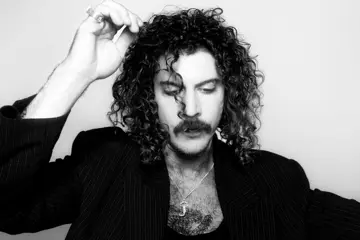THE SPECTACULAR NOW


Shailene Woodley hopes Miles Teller can take her back to the heady heights of The OC
The Spectacular Now begins in a familiar teen-movie place: with Miles Teller (last seen in the abhorrent bro-out 21 & Over) writing a college-entrance-application essay, talking about his life, and his love-of-life. Teller's the life of the party, and, even though you know his bubble's about to burst, a lifetime of teen-movie-conditioning reassures you that, as the film's rascally hero, he's sure to learn some lessons, get back on his feet, and be on his way into a promising future. But James Ponsoldt's picture has a way of subverting expectations, challenging the tired tropes of genre. It may start out in a montage-of-high-school-parties-with-smirkin'-voice-over-atop, but it soon becomes a painful portrait of the loss of innocence. Of adolescence giving way to adulthood via the discovery of various uncomfortable truths: about yourself, your family, and your lot in life. It's a film about a character obsessed with inhabiting the 'now', but who does so to escape from the past, and hide from the future.
Teller isn't just a small-town high-school senior out to have a good time, but a budding alcoholic; and, when he comes face-to-face with his long-absent father in a bar, it's clear that the whiskey runs in his blood. This is in keeping with Ponsoldt's two previous pictures, 2006's Off The Black and 2012's Smashed, low-key dramas that dared depict functional alcoholism; that avoided all the easy dramatic trappings of self-destruction and bottoming-out and wobbly sobriety, and instead inhabited an uneasy dramatic place. So, too, is The Spectacular Now unafraid of showing life as an emotional minefield; with every character harbouring scars, their bright or brave or obnoxious façades all a front to mask their pain.
Mary Elizabeth Winstead - who, in her searing leading turn in Smashed, shook off so much cute-girl baggage - appears as Teller's upwardly-mobile sister, and initially seems like a minor caricature, someone for the film to make jokes about; but her haute-bourgeois, luncheon-and-pearls housewife turn is, gladly, revealed to be its own outfit, the happiness a sham. Similarly, Jennifer Jason Leigh is initially presented as but a mom to rebel against; Brie Larson an ex-girlfriend to pine for and eventually get over; Dayo Okeniyi as the Other Guy to demonise. But ((500) Days Of Summer) writers Scott Neustadter and Michael H. Weber - working from a novel by Tim Tharp - get to add depth, contrast, and contrariness to all these smaller characters. Instead of being supporting players in our hero's drama, they're their own people, with their own agency. Teller's problem isn't the people around him, it's himself.
Don't miss a beat with our FREE daily newsletter
If this all sounds dark, well, it is. The Spectacular Now is the darkest teen-movie since The Perks Of Being A Wallflower, and it shares that film's earnest, Degrassi-ish quality. But the film is blessed with plenty of light, too, radiating from the central romance between Teller and Shailene Woodley. Richard Linklater long ago called his Before series 'romance for realists', and the same description applies here; especially given the realism with which it's depicted. Neither actor has the catalogue-model blandeur that normally passes for teen-film beauty, and Ponsoldt looks, lovingly, at the humanity in their pancake-free faces. The film's triumph is the first time they fuck: the filmmaker wiping away the old boning-in-tasteful-montage clichés, instead presenting a sustained single-take scene that creates an electric, enveloping atmosphere; inviting viewers into their bed, into the intimate, vulnerable, sacred space of two people coming together, letting their guard down.
It's one of three key moments shot in unbroken single-take: the others a long walk through rural woods that marks the first spark of romance; and a rambling, stumbling prom-night conversation, set against a lit-up football field, that's both filled with hopefulness and hopelessness. It's rare to see such unabashed auteurism in a teen-movie, but The Spectacular Now is a rare teen movie.
KILL YOUR DARLINGS
![]()

The study group hoped the Hogwarts library contained a hex to break gay spells
The great stereotypes of the beat poets - Drugs! Homosexuality! Obscenity! Lawlesness! Endless jazz music! - so lend themselves to drama that it's no surprise they're recurring cinematic fodder; recent years having given us documentaries on Kerouac and Burroughs, and features ranging from the good (Walter Salles' unduly maligned On The Road) to the not-good (Rob Epstein and Jeffrey Friedman's cringey Howl). Now, in blows John Krokidas's Kill Your Darlings, which indulges duly in those stereotypes: the film framed as a kind of mystery-thriller in which the young and stoned hurtle towards a presaged-on-opening tragedy. There's the benzadrine-blasted montages of feverish typing set to brassy, bombastic bop; the young-men-out-to-change-the-world giving inspiring and poetic speeches; and, finally, yet again, the Real Photos of the Real People in the credits.
Kill Your Darlings is, however, blessed by the fact that it's both well-cast and well-acted, with a run of intriguing turns including old Six Feet Under pals Ben Foster and Michael C. Hall doing the devil's work; a haunted, harried Jennifer Jason Leigh as Allen Ginsberg's mother; and David Cross - who played Ginsberg himself, in Todd Haynes's stereotype-skewering faux-biopic I'm Not There - as Ginsberg's father. The star-cross'd-lovers at the centre of it are Daniel Radcliffe (as Ginsberg) and Dane DeHaan (as a vision of love in blonde hair and white teeth), but the film has nary a note of romanticism; its vision of love one of projection, obsession, and manipulation. And Krokidas, making his debut, shows some directorial élan: a library-break-in sequence set to TV On The Radio's thumpingly-anachronistic Wolf Like Me taking the film out of its period-piece mannerisms. Gladly, the score dodges the familiar: Nico Muhly's typically thoughtful compositions utilising stereo channels, ricocheting between them as his movements progress in quick, frenetic, oft cacophonous bursts. It sounds great, it looks impressive, and its thesps are committed, but Kill Your Darlings stalls with its writing, and with its lack of storytelling daring. Ultimately, it feels like a modest take on immodest men.















